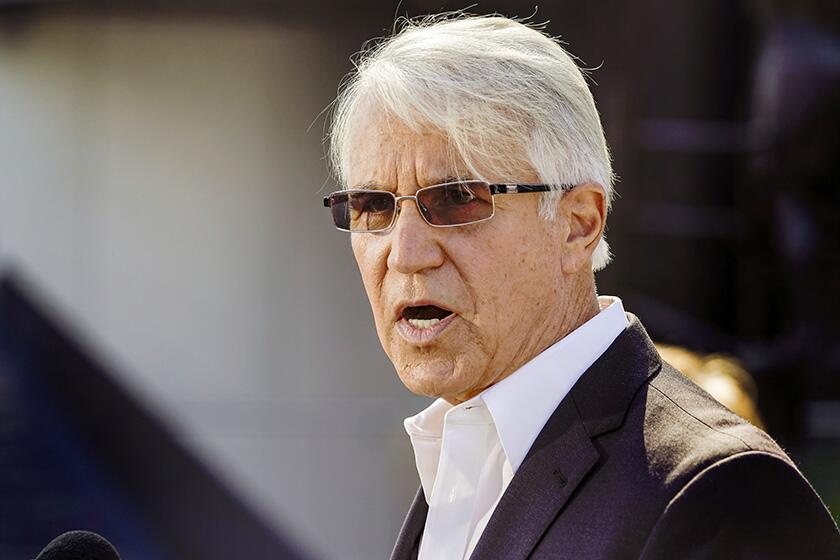Opinion: Jose Antonio Vargas’ question for GOP candidates: What do you want to do with us?

The Republican debate stage in Cleveland.
Of all the immigration-related questions I’d like to hear answered at tonight’s Republican presidential debate, this tops my list: What, exactly, do you want to do with us?
By “us,” I mean the estimated 11.3 million undocumented immigrants living and working in the United States, the majority of whom have called this country home for more than a decade.
According to a recent report by Pew Research Center, the country’s undocumented population “has remained essentially stable for five years after nearly two decades of changes” — a stark contrast to the bombastic “people-are-flowing-into-this-country-by-the-millions” warning repeatedly trumpeted by Donald Trump.
As a journalist who also happens to be an undocumented immigrant, I’d like to know what a Trump presidency would mean for me, and for people like me.
Trump says that, if elected, he would deport all undocumented immigrants and then allow the “good ones” to come back. But how does he plan to find, round up and deport all of us? How would that work? And who are the “good ones”? Are the “good ones” the undocumented workers who have helped or are currently helping build his businesses? Or the undocumented workers who have collectively paid billions in local and state taxes and contributed billions to Social Security? The Pew report estimates that 4 million undocumented immigrants have U.S.-born children, many of them minors. What will happen to those children, all American citizens, if Trump directs immigration services to deport either or both of their parents?
I shouldn’t pick on Trump; I have questions for the other candidates too.
How can Sens. Marco Rubio and Ted Cruz — who both say that any talk of reform is impossible without first securing the border — guarantee that the border will truly be secure? And at what cost? (Since the Sept. 11 attacks, the U.S. government has spent at least $100 billion on border security and immigration enforcement.) And how do they reconcile their emphasis on security with their experiences as children of Cuban immigrants?
In 2012, Rubio was one of four Republicans who backed a bipartisan immigration reform bill. In his book “An American Son,” Rubio writes: “If my kids went to sleep hungry every night and my country didn’t give me an opportunity to feed them, there isn’t a law, no matter how restrictive, that would prevent me from coming here.”
What would Rubio say to the parents of Central American children who crossed the border unaccompanied to escape violence and poverty? In Rubio’s view, what do U.S. policies (the war on drugs, the North American Free Trade Agreement, supporting certain regimes in Latin America) have to do with migration patterns?
Until last year, Cruz was a dual citizen, born in Canada to an American mother and a Cuban father. When Cruz decided to renounce his Canadian citizenship — “I left Calgary when I was 4 and have lived my entire life since then in the U.S.,” he said — I couldn’t help but think of the undocumented youth I’ve met who were born elsewhere (Mexico, Ecuador, India, Germany) but have grown up in the U.S. What is Cruz’s plan to address the future of the estimated 2.1 million youth who would qualify for legal status under the Development, Relief and Education for Alien Minors Act, or Dream Act, which is stalled in Congress?
And how does former Gov. Jeb Bush, who has repeatedly cited immigration reform as a top priority, plan to work with House Speaker John A. Boehner and other Republicans in Congress to pass a bill in both houses?
For all the complaints by many Republican candidates that President Obama is not enforcing the law, the reality is that the Obama administration has enforced the law to a historic extent, deporting more than 2 million immigrants in six years. But the majority of undocumented Americans are still here, working, going to school, providing for our families, and contributing to our communities.
Tonight’s GOP debate is being held in Ohio, a battleground state with a population of about 11.5 million, around the same number of undocumented immigrants in America. Can you imagine deporting all of Ohio?
Follow the Opinion section on Twitter @latimesopinion and Facebook
More to Read
A cure for the common opinion
Get thought-provoking perspectives with our weekly newsletter.
You may occasionally receive promotional content from the Los Angeles Times.











